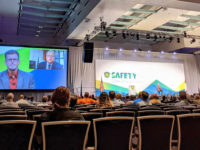Calif. heats up heat-safety compliance measures

 A top official of the California workplace-safety agency says farmers and ranchers should expect more purposeful visits from it and other labor agencies, as they monitor for compliance with heat-safety rules and other standards.
A top official of the California workplace-safety agency says farmers and ranchers should expect more purposeful visits from it and other labor agencies, as they monitor for compliance with heat-safety rules and other standards.
"We are going to be doing targeted inspections based on better surveillance. We're trying to refine and improve the targeting and the surveillance to be at the right places where we think there are likely to be violations," said Chief Ellen Widess of the state Division of Occupational Safety and Health, or Cal/OSHA, who spoke at the 18th annual AgSafe Conference in Monterey. "Agriculture will continue to be a major focus so folks can expect that during the summer months, we'll have our sister agencies out with us."
The multi-agency enforcement approach described by Widess was reaffirmed by Benny Cheng, northern regional manager of the state labor commissioner's office.
"We have joined forces with Cal/OSHA. The agencies are looking for employers who do not provide water or shade, and we are also checking for labor law violations," Cheng said, adding that the agencies also intend "to make sure that employers are complying with state labor law, to make sure that they have worker's compensation insurance and to make sure that when employees are paid wages that they furnish the itemized statement."
In response to concerns from employers about a lack of consistency when issuing citations, Widess said Cal/OSHA has invested additional time and resources to increase field staff training.
She said the agency has noted improving compliance rates on heat illness standards and characterized the level of compliance as "phenomenal."
"The fact that we're seeing so many more people in compliance means that the years of effort and collaboration within partnerships and the increased commitment of lots of folks in agriculture to heat illness prevention really paid off," Widess said. "But I want to emphasize that no one can rest on that good news. We're thrilled to see better compliance, but more vigilance is always necessary."
She said Cal/OSHA hopes to reduce the number of serious injuries in agriculture. Along with heat safety, she said, the agency will be watching out for all other possible health and safety hazards including lock-out/tag-out, electrocution hazards, driverless tractors, fall protection, unguarded machines and others.
Widess said the agency would like to "try and find those employers who really are putting workers at risk," while adding that Cal/OSHA officials "really want to try to do everything that we can to make it possible for good employers in agriculture to continue to thrive."
AgSafe board vice chairman Rudy Avila asked Widess for a change in the way Cal/OSHA conducts its inspections.
"Can we develop some kind of tag or form that says, 'I've been inspected 35 times this year'?" Silva said. "If we can do something like that, it would be helpful. We're here to help because we want to keep employees safe."
Widess said she would be willing to look into Silva's request.
She said Cal/OSHA has a new outreach program intended to educate employers and employees about confined spaces. Many of these confined-space situations are found in agriculture, Widess said, including tanks, silos, manure pits and sumps.
"It is really essential for every employer in agriculture to check out their workplace to see if there are any potential confined-space hazards," Widess said. "We are especially targeting them this year and we'll certainly be issuing citations."
Other areas that Cal/OSHA will be emphasizing this year include safety of agricultural equipment and machinery, transportation of workers, zoonotic diseases, or those diseases that can be contracted from an animal, and night work in agriculture.
"I appreciate from an employer's perspective that (working at night) is an important way to reduce risks of heat illness. We're interested and concerned about what might be problems of working at night, with visibility and fall hazards, cutting hazards, the equipment being used and adequate lighting," she said. "We want to work with agriculture and academia to figure out where the problems may be and where we can head them off."
Both Widess and Cheng noted that the former Economic and Employment Enforcement Coalition program has been changed to the Labor and Enforcement Task Force. Cheng, who supervises the task force, said the new program will focus on criminal investigations in the labor code, such as farm labor contractors that are unlicensed.
"Underground employers are robbing the state of resources and taxes, and they are cheating workers of fair wages and making it harder for good employers, especially employers in agriculture, to survive," Widess said.
Cheng said Labor Commissioner Julie Su wants to streamline the licensing and registration process for farm labor contractors. The commissioner's office has launched an online payment feature for licensing and growers now have the ability to verify a contractor's license online.
Contractors in the audience requested a more efficient process, with paperwork that is streamlined between state and federal agencies. Cheng said that the labor commissioner is constantly looking at ways to improve and streamline the process.
James Randles Sr. of Hall Management Corp. of Fresno said, "One of the problems is, you get no feedback from us in the discussion, but we are the ones actually doing it. We have complaints, but we'll work with you if you work with us."
The four-day AgSafe Conference attracted about 1,000 participants, who were able to choose among more than 90 safety classes offered in both English and Spanish.
Used with permission from the California Farm Bureau Federation.
Looking for a reprint of this article?
From high-res PDFs to custom plaques, order your copy today!





